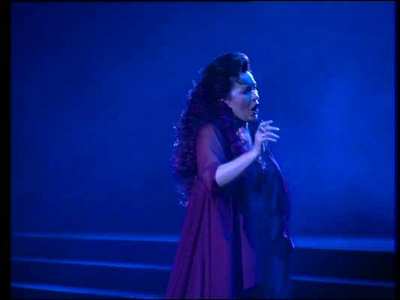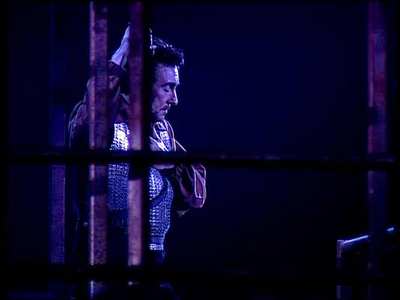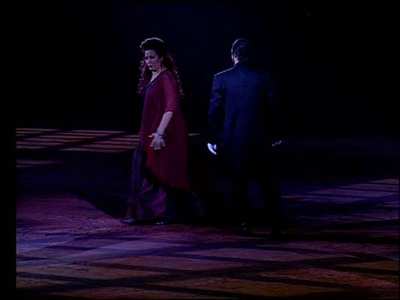Review of Verdi: Il Trovatore
Introduction
Otherwise known as The Troubadour, Il Trovatore is a tragic 15th century tale of an intense struggle over the beautiful Leonora. This story of revenge and passion shows the tragic fate of a long-lost brother and the loving heroine who bravely sacrifices everything to save him.
Here`s a breakdown of the four acts, which contain spoilers!
Act I: (The Duel)
Outside the guardroom of Aliaferia Palace in Aragon, Count di Luna`s soldiers are waiting to apprehend Manrico, a troubadour, who rivals the count for the favors of the Lady Leonora. Ferrando, captain of the guard, keeps his men awake by telling them of a Gypsy woman burned at the stake years ago for bewitching Di Luna`s younger brother. The Gypsy`s daughter sought vengeance by kidnaping the child and, so the story goes, burning him at the very stake where her mother died. Di Luna, though, still hopes his brother lives.
In the palace gardens, Leonora confides to Inez how at a tournament she placed the victory wreath on the brow of an unknown knight in black armor; she saw him no more until he came to serenade her. Though Inez has misgivings, Leonora declares her love for the handsome stranger. No sooner do the women reenter the palace than Di Luna arrives to court Leonora. Simultaneously Manrico`s song is heard in the distance, and Leonora rushes to greet him. The jealous count challenges Manrico to a duel, and they hurry away.
Act II: (The Gypsy)
As dawn breaks in the Biscay mountains, Gypsies sing at work with hammer and anvil. Azucena - the Gypsy`s daughter described by Ferrando - relives her mother`s fiery execution, recalling the dying woman`s plea for vengeance. Manrico asks to hear her full story, becoming confused when Azucena, overwhelmed with memories, blurts out that by mistake she hurled her own son into the flames. Assuring him of a mother`s love, Azucena makes Manrico swear revenge, but he says a strange power stayed his hand when he could have killed Di Luna in the duel. A messenger brings news that Leonora, thinking Manrico dead, plans to enter a convent. Despite Azucena`s pleas, Manrico rushes away.
Di Luna, burning with passion for Leonora, waits by the cloister to kidnap her. When she enters with the nuns, he strides forward, only to be halted by Manrico, who suddenly appears with his men. As the forces struggle, the lovers escape.
Act III: (The Gypsy`s Son)
Di Luna has pitched camp near the bastion of Castellor, where Manrico has taken Leonora. After soldiers sing of their eagerness for victory, Ferrando leads in Azucena, who was found nearby. The Gypsy describes her poor, lonely life and says she is only searching for her son. Di Luna reveals his identity, at which Azucena recoils and is recognized by Ferrando as the supposed murderer of Di Luna`s baby brother. The count orders her burned at the stake.
Inside the castle, Manrico assures Leonora her love makes him invincible. As the couple prepares to go to the wedding chapel, Manrico`s aide Ruiz bursts in to say that Azucena has been seized and tied to a stake. Manrico stares in horror at the distant pyre, which has been lit. He runs to his mother`s rescue, vowing vengeance.
Act IV: (The Torture)
Ruiz brings Leonora to the foot of the captured Manrico`s prison tower, where she voices her undying love and prays for his release. Monks are heard intoning a doleful Miserere for the soul of the condemned, while Manrico sings farewell from inside the bastion. Leonora resolves to save him. When Di Luna appears, Leonora agrees to yield to him but secretly swallows poison.
In their cell, Manrico comforts Azucena, who longs for their home in the mountains. No sooner does the old Gypsy fall asleep than Leonora rushes in to tell her lover he is saved, urging him to flee. Manrico comprehends the price of his freedom and denounces her, but the poison begins to take effect. He takes her in his arms as she dies. Furious at being cheated of his prize, Di Luna sends Manrico to the executioner`s block, while Azucena staggers to her feet to see the ax fall. She cries out that her mother is avenged: Di Luna has killed his own brother.

Video
The back of the box states, "16:9", which to me means this should be enhanced for widescreen TVs, but it`s not as the opera is 4:3 fullscreen. My disappointment aside, the transfer does look clean and detailed. There are plenty of dark scenes and this tends to show up the grain in the video, but it`s not a distraction. Since this was shot on digital video, there are no glitches. Nor are there any signs of compression.

Audio
Three soundtracks: Dolby Digital 2.0 (224Kbps) and 5.1 (448Kbps), and DTS 5.1 (768Kbps). The 2.0 sounds a little flat whereas the 5.1 sound of both DD and DTS sound nice and expansive. LFE performs well when required to and there`s nice ambient sound from the surrounds. The sound is crystal clear and when the chorus sounds, it`s forceful enough to enjoy.

Features
None. The DVD features clear and easy to read English plus other language subtitles.

Conclusion
This remains one of Verdi`s most popular operas and is a firm favourite with audiences. Without doubt this, along with my personal favourite, Rigoletto, and La Traviata are the three great Verdi operas as he reached maturity. It`s the usual love triangle situation but something that has real heart and soul to it. There`s so much music and orchestration to enjoy here that you`re sure to raise the volume a little. The performances too are wonderful and with so much space to move about and perform in, it gives the audience a chance to appreciate a wide stage setting with all the performers. The production design, while simple in appearance works very well, especially given the fact that most of the story takes place in darkness, lit by well positioned lights and candles. Some scenes are beautiful to behold in conjunction with some of Verdi`s wondrous arias.
It`s a shame that the video isn`t widescreen enhanced because a wider picture would have gone hand in hand with the dynamic soundtrack on offer. Despite this, and the lack of extras, it`s a good version of Verdi`s Il Trovatore and worth checking out if you`ve previously enjoyed this opera.
Your Opinions and Comments
Be the first to post a comment!